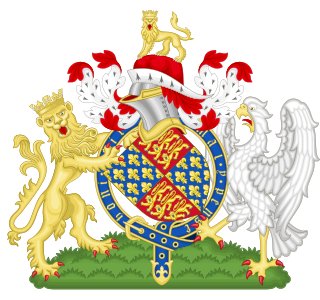Related Research Articles

Under the law of the United Kingdom, high treason is the crime of disloyalty to the Crown. Offences constituting high treason include plotting the murder of the sovereign; committing adultery with the sovereign's consort, with the sovereign's eldest unmarried daughter, or with the wife of the heir to the throne; levying war against the sovereign and adhering to the sovereign's enemies, giving them aid or comfort; and attempting to undermine the lawfully established line of succession. Several other crimes have historically been categorised as high treason, including counterfeiting money and being a Catholic priest.

Arson in royal dockyards was a criminal offence in the United Kingdom and the British Empire. It was among the last offences that were punishable by execution in the United Kingdom. The crime was created by the Dockyards etc. Protection Act 1772 passed by the Parliament of Great Britain and was designed to protect Royal Dockyards and vessels from arson attacks.
Misprision of treason is an offence found in many common law jurisdictions around the world, having been inherited from English law. It is committed by someone who knows a treason is being or is about to be committed but does not report it to a proper authority.

The Treason Act 1351 is an Act of the Parliament of England which codified and curtailed the common law offence of treason. No new offences were created by the statute. It is one of the earliest English statutes still in force, although it has been very significantly amended. It was extended to Ireland in 1495 and to Scotland in 1708. The Act was passed at Westminster in the Hilary term of 1351, in the 25th year of the reign of Edward III and was entitled "A Declaration which Offences shall be adjudged Treason". It was passed to clarify precisely what was treason, as the definition under common law had been expanded rapidly by the courts until its scope was controversially wide. The Act was last used to prosecute William Joyce in 1945 for collaborating with Germany in World War II.
Misprision of felony is a form of misprision, and an offence under the common law of England that is no longer active in many common law countries. Where it was or is active, it is classified as a misdemeanor. It consists of failing to report knowledge of a felony to the appropriate authorities. Exceptions were made for close family members of the felon and where the disclosure would tend to incriminate him of that offence or another.
Misprision in English law describes certain kinds of offence. Writers on criminal law usually divide misprision into two kinds: negative and positive.

The Offences against the Person Act 1861 is an Act of the Parliament of the United Kingdom of Great Britain and Ireland. It consolidated provisions related to offences against the person from a number of earlier statutes into a single Act. For the most part these provisions were, according to the draftsman of the Act, incorporated with little or no variation in their phraseology. It is one of a group of Acts sometimes referred to as the Criminal Law Consolidation Acts 1861. It was passed with the object of simplifying the law. It is essentially a revised version of an earlier Consolidation Act, the Offences Against the Person Act 1828, incorporating subsequent statutes.
The law of Northern Ireland is the legal system of statute and common law operating in Northern Ireland since the partition of Ireland established Northern Ireland as a distinct jurisdiction in 1921. Prior to 1921, Northern Ireland was part of the same legal system as the rest of Ireland.

The Malicious Damage Act 1861 is an Act of the Parliament of the United Kingdom of Great Britain and Ireland. It consolidated provisions related to malicious damage from a number of earlier statutes into a single Act. For the most part these provisions were, according to the draftsman of the Act, incorporated with little or no variation in their phraseology. It is one of a group of Acts sometimes referred to as the Criminal Law Consolidation Acts 1861. It was passed with the object of simplifying the law. It is essentially a revised version of an earlier consolidation Act, the Malicious Injuries to Property Act 1827, incorporating subsequent statutes.
Compounding a felony was an offence under the common law of England and was classified as a misdemeanour. It consisted of a prosecutor or victim of an offence accepting anything of value under an agreement not to prosecute, or to hamper the prosecution of, a felony. To "compound", in this context, means to come to a settlement or agreement. It is not compounding for the victim to accept an offer to return stolen property, or to make restitution, as long as there is no agreement not to prosecute.
Defamatory libel was originally an offence under the common law of England. It has been established in England and Wales and Northern Ireland. It was or is a form of criminal libel, a term with which it is synonymous.

The Treason Act 1945 was an Act of the Parliament of the United Kingdom.

The Criminal Law Act 1967 is an Act of the Parliament of the United Kingdom that made some major changes to English criminal law, as part of wider liberal reforms by the Labour government elected in 1966. Most of it is still in force.
Wasting police time is listed as a criminal offence in many Commonwealth countries.
Marital coercion was a defence to most crimes under English criminal law and under the criminal law of Northern Ireland. It is similar to duress. It was abolished in England and Wales by section 177 of the Anti-social Behaviour, Crime and Policing Act 2014, which came into force on 13 May 2014. The abolition does not apply in relation to offences committed before that date.
Child destruction is the name of a statutory offence in England and Wales, Northern Ireland and Hong Kong. The offence of that name has been abolished and replaced in Victoria, Australia.

The Accessories and Abettors Act 1861 is a mainly repealed Act of the Parliament of the United Kingdom of Great Britain and Ireland. It consolidated statutory English criminal law related to accomplices, including many classes of encouragers (inciters). Mainly its offences were, according to the draftsman of the Act, replacement enactments with little or no variation in phraseology. It is one of a group of Acts sometimes referred to as the Criminal Law Consolidation Acts 1861. It was passed with the object of simplifying the law. It collected the relevant parts of Peel's Acts and others.
Common law offences are crimes under English criminal law, the related criminal law of some Commonwealth countries, and under some U.S. State laws. They are offences under the common law, developed entirely by the law courts, having no specific basis in statute.
Causing bodily harm by wanton or furious driving is a statutory offence in England and Wales and Northern Ireland. It has been abolished in the Republic of Ireland.
The first signs of the modern distinction between criminal and civil proceedings were during the Norman conquest of England in 1066. The earliest criminal trials had very little, if any, settled law to apply. However, the civil delictual law was highly developed and consistent in its operation.
References
- ↑ The Criminal Law Act 1967 (c.58), section 5(5)
- ↑ The Criminal Law Act (Northern Ireland) 1967 (c.18) (N.I.), section 5(5)
- ↑ The Criminal Law Act 1997 (No.14), section 8(3)
- ↑ The Law Commission (10 May 1977). "Treason, Sedition and Allied Offences" (working paper No. 72), paragraphs 6, 43, 67 and 96(5) – via BAILII.